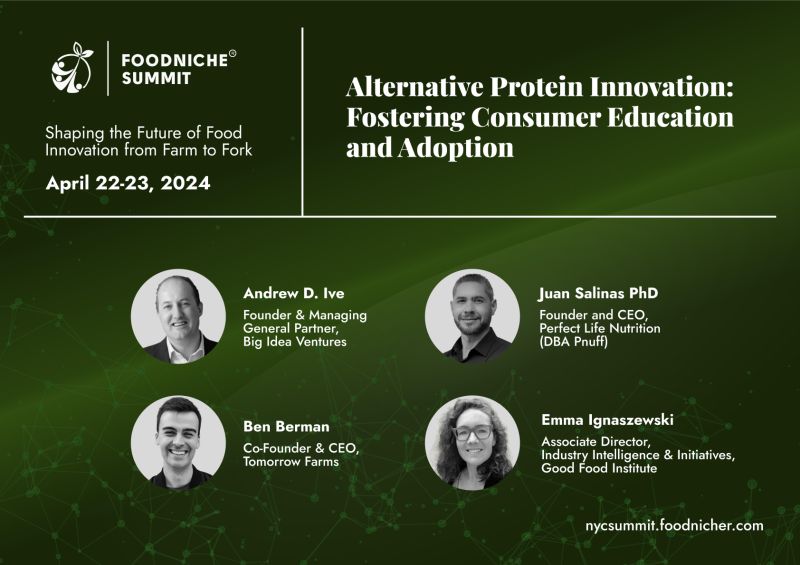In a celebration of innovation driving the evolution of the food industry, twelve pioneering food technology companies are set to take the stage at the FoodNiche Summit on April 22nd, 2024. They will have the unique opportunity to showcase the challenges they are tackling and outline their vision for the future of the food system.
Carefully curated from a diverse pool of thirty companies worldwide, these finalists hail from different geographical regions. Each company has been selected for its innovative approach and potential to make a significant impact on the food industry landscape.
The finalists for each of the four categories are listed below:
Category: FoodTech (e.g. AI, IoT, Blockchain)
Tastewise is an AI-driven platform dedicated to helping companies in the food and beverage industry innovate faster than before. The Tel-Aviv-based company’s disruptive AI models create scalable, personalized, and innovative products and communications that predict today’s consumer and planetary needs. To date, the company has raised more than $21 million as it looks to add to its illustrious list of clients that include giants like Nestle, PepsiCo, and Kraft Heinz.
Moa foodtech is a B2B platform focused on creating sustainable and healthy food ingredients to cater to the fast-growing demand for food production. Leveraging AI, MOA foodtech optimizes the valorization of food byproducts through fermentation. With $1.74 million raised in funding over two rounds, the company aims to reintroduce these byproducts into the food chain to provide a sustainable alternative to animal and plant-based protein.
At EatQ, food brands are empowered with the essential tools to excel in the digital age. According to the company, it facilitates a dynamic exchange between food brands and consumers, fostering mutual learning and engagement aimed at promoting healthier eating habits. EatQ champions products that prioritize health and transparency, providing consumers with clear information on ingredients, sourcing, processing, and ethical standards. Ultimately, the goal is to build trust between consumers and the products they select.
Category: Alternative Proteins – Cultivated Meat
Ever After Foods specializes in developing cultivated meat using a proprietary technology platform designed for cost-efficient scalability. Ever After Foods focuses on revolutionizing the meat industry by producing meat products through cellular agriculture techniques rather than traditional animal husbandry. This approach aims to provide sustainable, ethical, and environmentally friendly alternatives to conventional meat production methods.
SeaWith Inc. is a South Korean cultivated meat startup aiming to improve the health of 10 billion meat consumers through cultivated meat. Using its proprietary growth media and scaffolding developed from seaweed, SeaWith Inc. has developed welldone™️, a sustainable and low-cholesterol meat alternative for consumers, food companies and chefs.
Next Meats is a cultivated meat startup aiming to create a new standard and culture for food that are environmentally conscious. Founded in 2021, the Tokyo-based startup has a host of products under its belt, including the world’s first vegan yakiniku barbecue meat.
Category: Alternative Proteins – Dairy & Ingredients
InnovoPro is a food tech startup bringing chickpea protein to the global food and beverage market. InnovoPro is the first company to develop and launch a 70% chickpea protein concentrate. The company secured $18 million in Series B funding in 2020.
At Onego Bio, the focus is on shaping the future of food through the utilization of living microorganisms for protein production. Through a sustainable and efficient precision fermentation process, Bioalbumen®—the animal-free egg white—is produced. The impact of this technology extends beyond environmental and animal welfare benefits, also positively affecting supply chain stability, global health, and food security. This approach enables the production of bioidentical egg protein, offering sustainable, flavorful, and nutritious food options without compromising quality.
Helaina invented a biomanufacturing platform to recreate the key bioactive proteins found in human milk and throughout the human body. These proteins play a critical role in advancing immune, gut, and brain health. Helaina makes its proteins with a similar process to how Human Insulin is made, but at the cost of food. Helaina leverages its proprietary precision platform to “teach” yeast to produce these important bioactive proteins found natively in our bodies during the fermentation process. The final product is a highly pure and supremely functional protein. Helaina’s first protein is Human Lactoferrin, one of nature’s true foods. It is highly concentrated in human colostrum and breast milk – it is produced by the body to be consumed for health benefits. Helaina opens access to these functional human compounds to consumers creating the next category of essential nutrients.
Category: Sustainability
Mush Foods is a company on a mission to slash global meat consumption by half. Using a circular process, Mush Foods grows mushroom mycelium with its pioneering technology to produce sustainable ingredients for food companies. The startup recently launched its 50Cut mushroom blends for food service, having secured a $6.2m seed round funding.
Too Good To Go is a social impact company taking a new approach to combating food waste. Through its mobile app, Too Good To Go connects restaurants with surplus/unsold food to customers who can buy the food and prevent wastage. To date, its community of 90 million consumers and 150,000 food businesses have rescued 300 million meals from going to waste across Europe and North America.
Babylon Microfarms is a company that specializes in creating and providing innovative solutions for indoor farming. Their focus lies in developing micro-scale hydroponic systems that enable individuals and businesses to grow fresh produce in small spaces, such as homes, restaurants, or offices. These systems typically utilize advanced technology to optimize plant growth while minimizing resource consumption, allowing for efficient and sustainable food production.

















